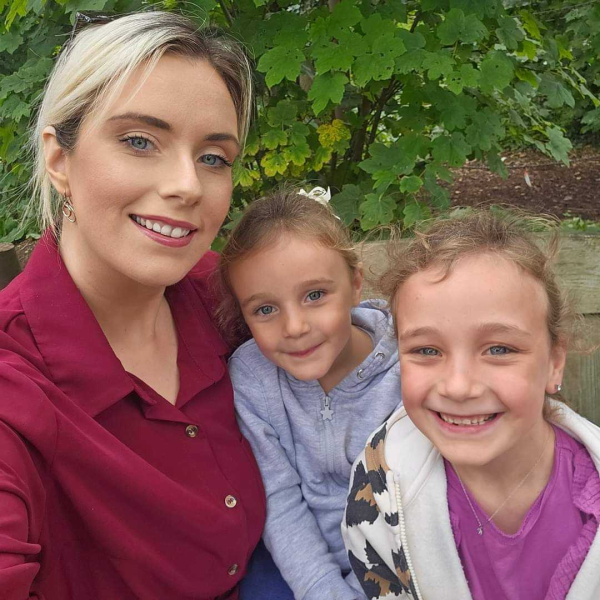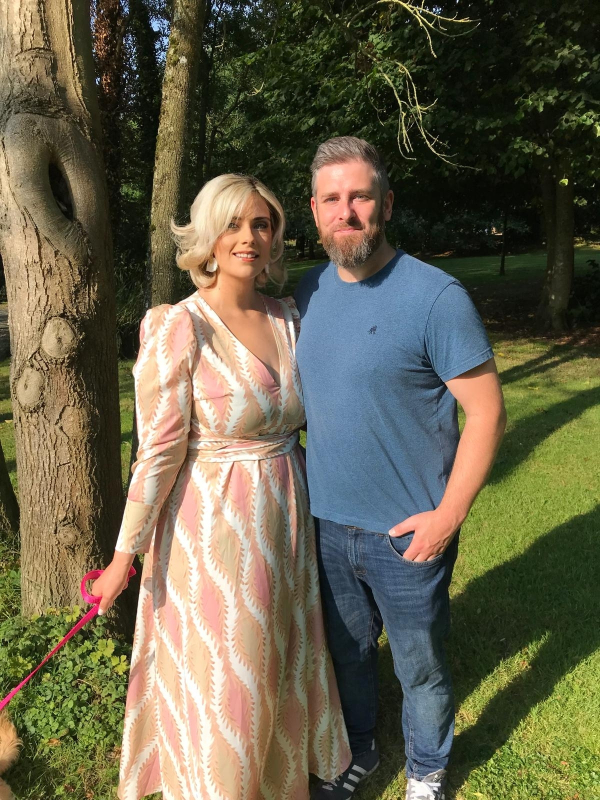
Amy, from Armagh, was told last year she has heart failure, at the age of just 32. The news came as a devastating blow after Amy had already been on a difficult journey with her heart health, as she explains; “When I was told I had heart failure, I couldn't comprehend what the doctor was telling me. I didn’t know anything about heart failure. I had maybe seen it on TV and to me, heart failure was the end of your life, so it was terrifying. When I got the news, I felt like I was being dragged down again, after everything I had already been through.”
In 2022, Amy suffered three heart attacks and was diagnosed with a rare heart condition called Spontaneous Coronary Artery Dissection (SCAD) which is when a tear happens in the wall of a coronary artery. This all came completely out of the blue for Amy; “I had never had any issues with my health, certainly not with my heart. I was only 31, and my little girls, Fianna and Róise, were 2 and 3 years old at the time so it was an unbelievably frightening time.”
“I had been to see my GP because I had experienced pains in my chest and left arm and felt nauseous and dizzy one day. Believe it or not, none of those things registered with me that it could be something serious. I just didn’t think that was a possibility because of my age and general health but my doctor sent me to Craigavon Area Hospital A&E. I had tests done and then saw the Consultant Cardiologist who told me I’d had a heart attack, and I just couldn’t believe what I was hearing. She told me my troponin levels were over 3000 and 14 or more shows you have had a heart attack. I was in total shock.”
“I ended up in hospital for a week as I needed to have a procedure called an angiogram which is a heart test that looks at the blood supply of your heart, but the ward’s machine was broken, and they were waiting on parts to fix it. I was having small niggles here and there but generally felt ok and was up walking about. One night however I had another heart attack, and the pain was unbearable. You would think having a heart attack on the cardiology ward means you’re in the right place, but they still had no angiogram machine which meant there was little they could do, so I was blue-lighted in an ambulance to the Royal Victoria Hospital in Belfast.”
Amy continues; “When I was having the angiogram there, the Consultant told me my artery was blocked but it was nothing to do with plaque or my cholesterol, it had spontaneously torn open and that this condition was called SCAD. I just couldn't get my head around what he was telling me.”
“I had a procedure called a PCI and a ballon was inserted into my artery to blow it open again. After the procedure I was on complete bed rest. I was afraid to even cough or sneeze and it was terrible. A few weeks later I went back to work as a Care Manager and 16 weeks after that I started to feel chest pain again one evening. It wasn’t like the pain I felt before and I thought ‘it's not a heart attack because I know what a heart attack is like now.’ I went to bed that night but the next morning I still didn’t feel right so I went to the hospital. Once again, my troponin levels were sky high, and I was told I’d had another heart attack.”
“I was once again sent to the Royal Vicotria Hospital for an angiogram which showed I’d had another SCAD, but on a different artery. I had another balloon PCI, and I was in hospital for a week. Again, I went back to work and at the start of January 2023 I went to my doctor because I was not feeling at all well. I was exhausted, completely drained, and was short of breath but I put that down to the fact that I’d had 3 heart attacks! I was still working full-time because as a single parent of 2 young children I had no other option, I had to just get on with it.”
“I had bloods done and the doctor told me my BNP levels were over 900. She explained that anything over 400 would be an indicator that you are in heart failure and the higher number, the more severe your heart failure is. I came out of that appointment feeling dizzy, like I was going to be sick. I had to get my phone out and Google heart failure as I didn’t understand what I was dealing with. I’d already had the trauma of being diagnosed with SCAD, that was enough, but to have heart failure on top of that. I just couldn't get my head around it.”
Amy was then sent for further tests and explains; “I went for an echocardiogram a couple of days later and it showed my heart function was at 40%. I had to go again eight weeks later and by then my function had gone down to 35%. I was expecting a situation of ‘you have been diagnosed with this, but you are going to get better’, but I was getting worse. I have always had low blood pressure, and the heart failure medication knocked me for six, it was horrendous. The heart failure team explained the medication is designed to take as much pressure off your heart as possible, but it really affected me. Before the medication I was absolutely exhausted, but once I was on it, I couldn't function, it made me 100 times worse. But the team worked with my medication to get it to a level that works for me and that I can manage.”
“Again, I continued working until December 2023 when I literally couldn't do it anymore. I couldn't function in my day-to-day tasks of getting the children to school, getting myself to work, the rush of the motorway, things you would never think twice about. By that stage I had no quality of life, I was exhausted all the time, and it was horrendous. I had to stop working. I had never had a chance to heal after everything- I had battled on after getting this life-changing diagnosis and both the physical and mental impacts of that were huge, it took its toll on me.”
As the months have passed, Amy is feeling a bit more settled as she explains; “I have had time to read up and learn about my condition and I’ve had time to rest. Beforehand, it felt like a death sentence. My first reaction was, ‘heart failure, that means my heart is going to die, how long do I have left?’ I felt like I had a timer on me. I did lots of my own research however and that moved me away from that thinking and I realised, although it isn’t curable, heart failure was not the end of my life, I could learn to live with it.”
“That is why I’m supporting Northern Ireland Chest Heart & Stroke’s campaign, to spread awareness and help people understand heart failure better. To understand what it means if they, or a family member or friend, get a diagnosis. There is often a lot of jargon used in medical settings and I want to play my part in helping people break through that and understand what heart failure is. There are so many people affected by the condition in NI and more will be, so it’s something people need to be aware of and we need to be talking about more.”

“I also want to highlight that heart failure can affect people of any age. I am only 33. People assume heart failure only affects people in their seventies and eighties but that’s not the case. The prognosis for younger people can also be hugely different and that’s something I really want people to understand. You can’t stick one diagnosis and one prognosis onto everyone. It’s so important that anyone of any age who is experiencing any potential signs of heart failure, or any other cardiac condition, are aware and get things checked out.”
Even though Amy is on medication, she suffers from symptoms of heart failure every day. “I'm exhausted most of the time, I’m short of breath and I can’t begin to explain the impact this has had on my life. It was horrible for my children to see me having to go to hospital and have procedures and now I just don't have the same energy for them. They are only 4 and 5 years old and that is heartbreaking.”
“I met my partner, James, after my diagnosis, and our relationship is different because of it. My children, go to bed at 6.30/7pm and I have to go to bed after them. I can't function after that sort of time and he’s very understanding of that, but it affects me mentally as I feel bad about it.”
“I'm only 33. My friends will be going out going for a drink or a meal and that's just completely out of the question for me. Those might sound like silly things, but it's more the fact the choice has been taken away from me. Heart failure completely rules everything in my life and that’s the reality of it.”
“The exhaustion is hindering but my anxiety is bad too, so I struggle to actually get to sleep. That's when the worry starts to kick in for me, when I’m lying in bed, exhausted, trying to get to sleep. The reality of it all kicks in and it’s terrifying at times. The mental impact is as tough as the physical impact.”
“As they say however, time is a great healer and as it goes on, I’m dealing with things. This has changed me in so many ways but I’m trying to be positive and am moving on with my life as it is now as best I can.”
Find out more about heart failure and how we can support you and your family.
